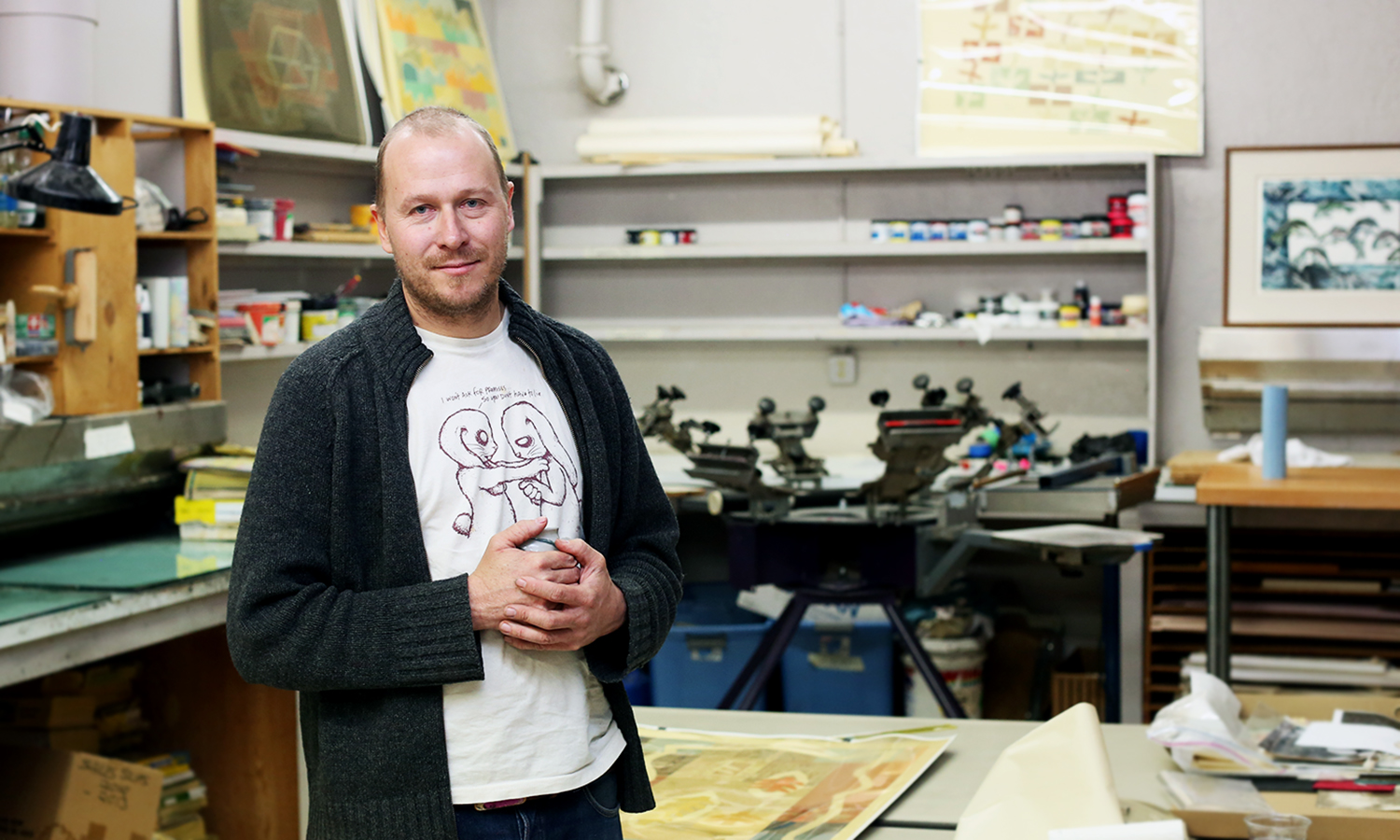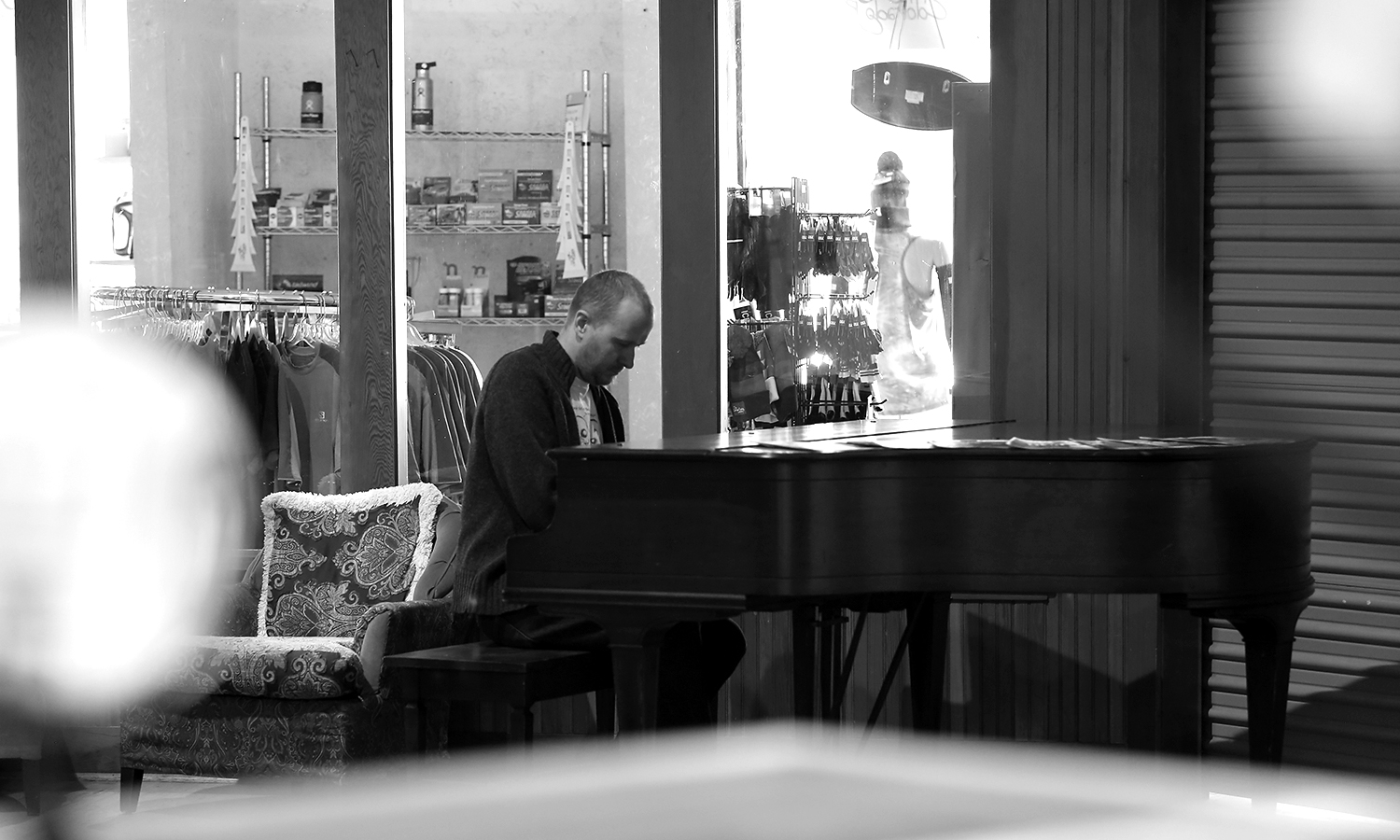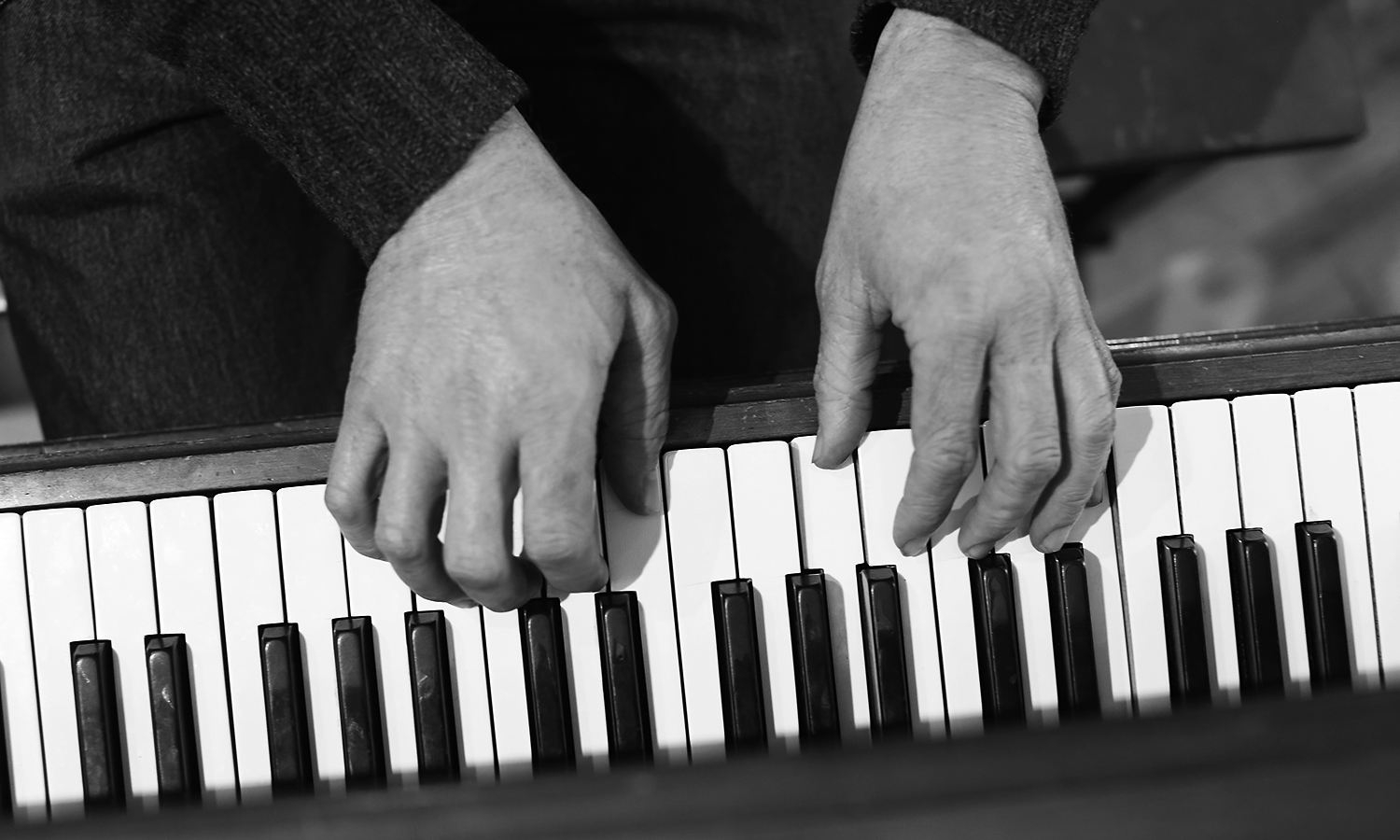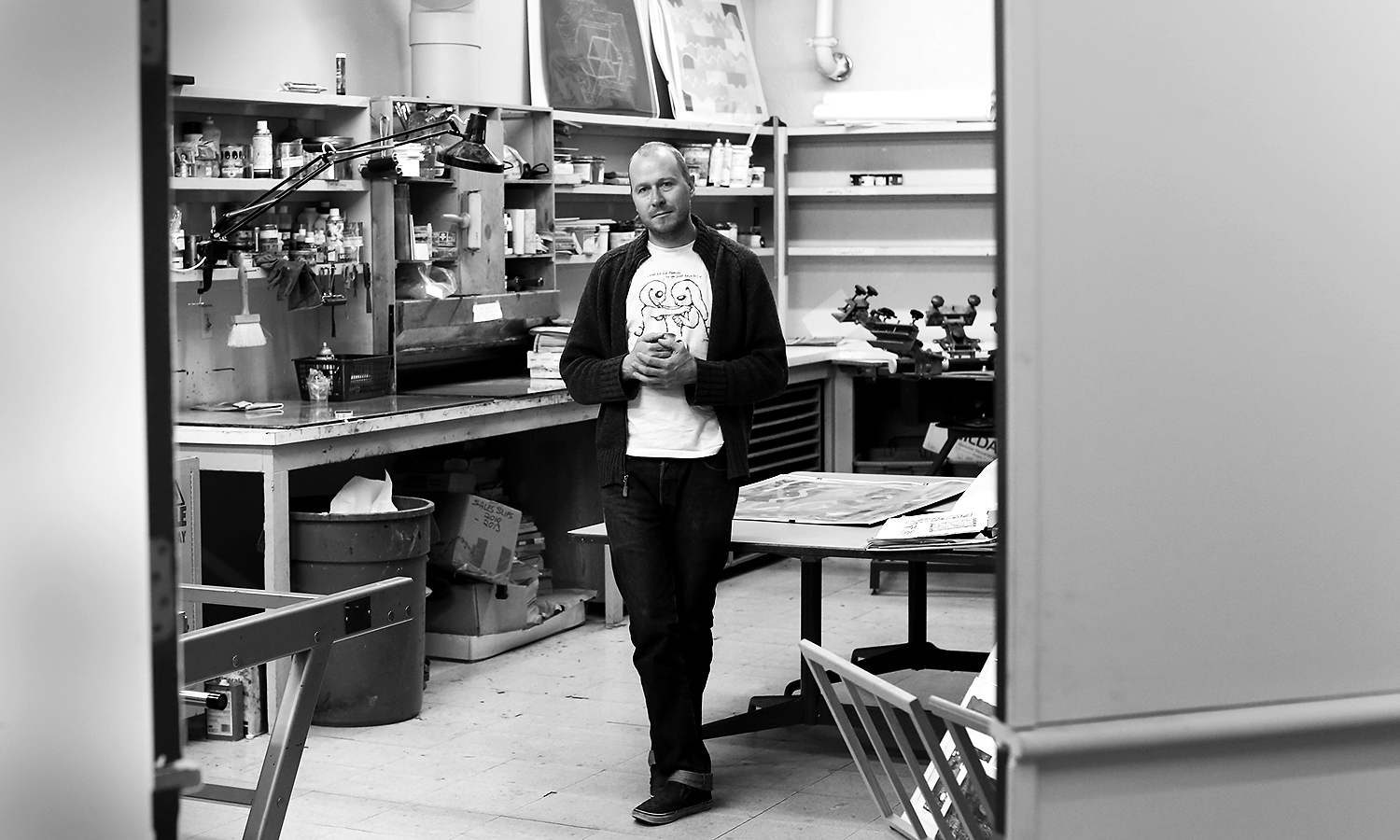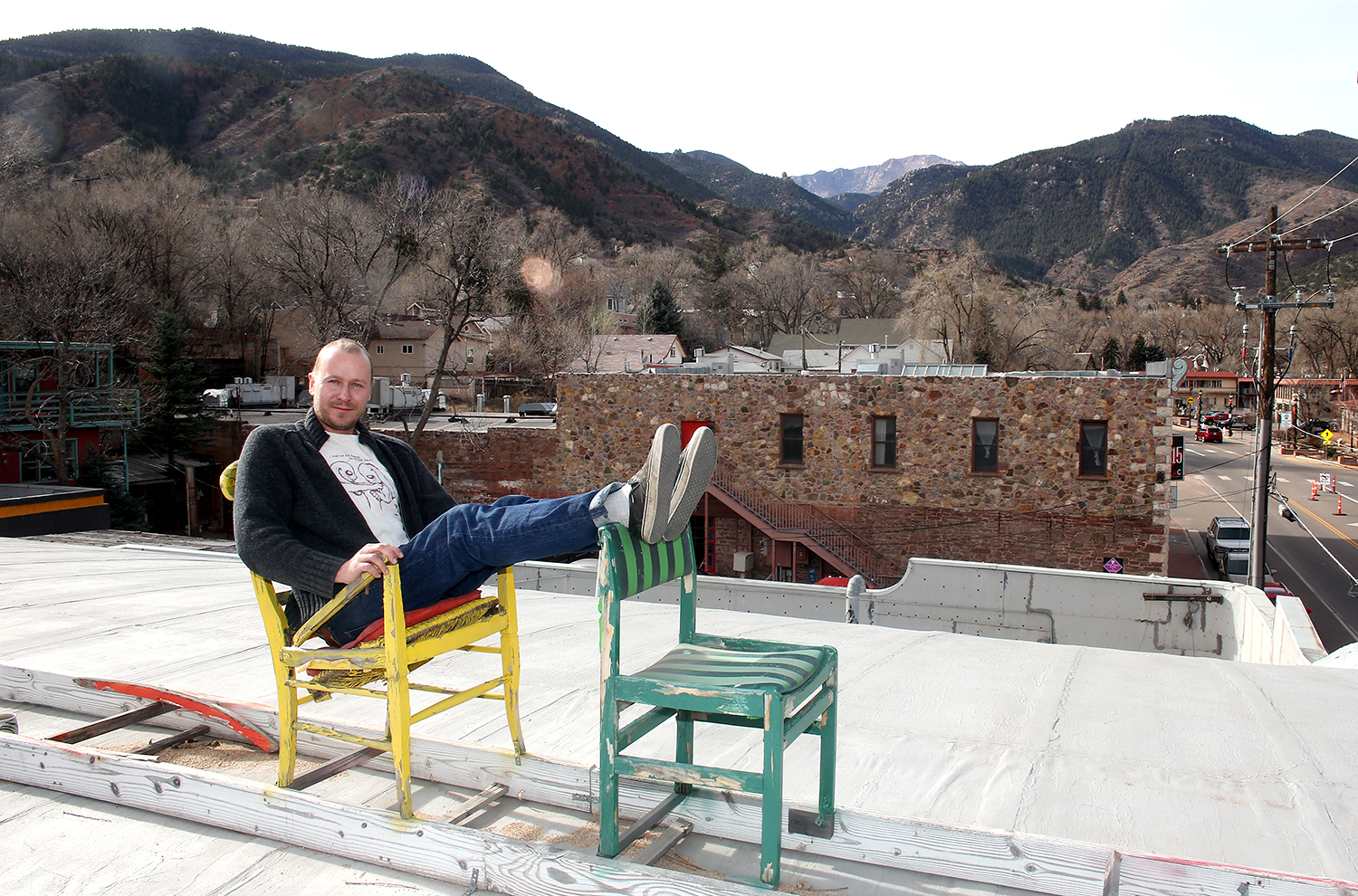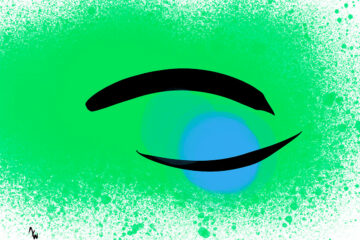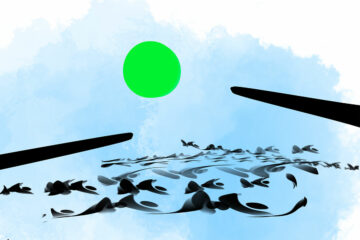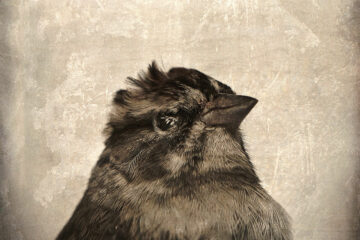Dustin Booth leans back in a chair in the Manitou Art Center, something he rarely gets to do while juggling many hats as manager of the MAC. He uses the word “fortunate” often as he tells his story. He laughs and smiles. He’s easygoing.
An artist with a varied background, Dustin seems uniquely qualified for his role at the MAC. He serves as curator, tour guide, teacher, promoter, gallery manager, maintenance man and all-around go-to-guy.
Dustin talks with Humanitou about his unusually free upbringing in a creative cauldron in Nebraska. He talks about his time as a rapper and musician, leaving a full ride to college after six weeks, and learning from renowned screen printing artists.
Dustin also speaks to life philosophy, creativity, Frank Zappa’s influence … and he sits down at the grand piano in the MAC and improvises impressively for several minutes.
Humanitou: I read recently in a Confluence Denver article that you were a performing musician for many years.
Dustin: I started playing music when I was 15. I’m 42 now. That was a big focus, a big part of my life. Music really was my focus for probably close to a good 20 years. I had a lot of fun, a lot of crazy stories I could tell with that. (laughs)
I played in four or five different bands all through that time. My first band was DJ Corkeee Nine and the Corduroy Love Tabernacle Choir, when I was in high school.
Humanitou: What motivated that?
Dustin: I would say, when I started listening to the music of Frank Zappa, it actually changed my life creatively in a lot of ways, because when I started listening to his music I had this big breakthrough that with art you can do anything.
There was this moment of, like, I realized the limits really are the limits you have, the limits you’re putting on yourself. That kind of changed my trajectory. I was, like, I have this uninterrupted field of possibilities. I started experimenting with different things.
Humanitou: What all talents did you tap into with these bands?
Dustin: I started singing, badly. And rapping, terribly. Then that moved into picking up the guitar and learning the guitar, which I got completely obsessed with. I had a very rigid practicing schedule for quite a few years, where I would practice for three or four hours a day.
I eventually got to a point where I felt confident with the guitar and I decided to go to music education school. So, I did that, where I learned the piano. I learned orchestration and conducting.
And then I got to a point where I almost finished my music education degree and I got bored, I guess. (laughs) And I didn’t really see being a band teacher as my path, so I stopped.
At that point is when I moved to Manitou.
Humanitou: Let’s step back. You were a rapper?
Dustin: I was DJ Corkeee Nine. But I rapped, so I wasn’t DJing. I was MCing, technically. I mean, really, this was high school and mostly was just to have fun. It ballooned into, I think, we had nine members on stage with a horn section. We would raid thrift stores and come up with the most ridiculous costumes we could.
We had another rapper-slash-singer who played the marching band quad (drums) and he could do backflips.
Humanitou: You’ve mentioned living in some different places. Where do you come from to Manitou?
Dustin: So, it’s kind of a crazy story. My dad lives in Salida, Colorado. My mom lives in Nebraska. I spent a lot of my childhood in Nebraska. I went to high school in Lincoln, Nebraska. And then I have been pretty much based here in Colorado, in general, since 1994.
I’ve lived in Salida. I lived in Durango, Denver, Pueblo, Steamboat for a little bit. And Manitou and Colorado Springs.
Humanitou: I’m from the Midwest. I’m curious, how did DJ Corkeee Nine go over in Lincoln as a high school student?
Dustin: It actually went over really well. This was the early Nineties, mid Nineties. Honestly, at that time there was a great creative explosion in Lincoln, Nebraska. I couldn’t have asked for a better high school experience.
There were tons of talented musicians there. We had a lot of venues that were very supportive and let us all play. There was this moment of everybody I went to school with was in a band all of a sudden, because it was just this thing that was there and available. It was constant.
We had everything from hardcore punk bands to freak shows, semi-comedy bands like us. It was this huge gamut of just doing really interesting stuff.
It definitely has carried on in my life, being in a really creative community, being around people that have crazy ideas and are willing to try them and see where they go.
Humanitou: That was absolutely not my high school experience in a small, rural town in northern Missouri. Lincoln is bigger, though, and a college town. Do you think that helped?
Dustin: Probably. Lincoln, I’d say, is a liberal town, too. I haven’t spent time in Nebraska in 25 years. I don’t know if it’s like that now. But in, like, ’91 to ’94 it was a very fertile opportunity. We supported ourselves. We’d go see other bands. There was this constant social thing to it.
The Red & Black cafe was one of our haunts. It was started by an anarchist and a communist, which is why it was the red and the black. Neither of them were capitalist, so it, obviously, went under, (laughing) because they wouldn’t charge money for anything. It was pretty great.
That place would be packed full of kids. Friday night, it would be full of kids drinking tea and drinking water, and just listening to ridiculous music. Totally amateur high school-level, banging on our guitars and trying to do back flips.
Humanitou: What do you see in that, or elsewhere in your life, as a linchpin, a shaping experience for who and where you are now, how you see things?
Dustin: You know, I’d say my path, in general, is pretty zig-zaggy. There’s definitely not direct lines towards anything. I would say my guiding philosophy is just to do something that I find interesting.
I definitely was fortunate enough to have parents and my grandfather, they kind of let me do that. They started treating me as an adult really young. I moved out of my parents’ house when I was 15. I had a better opportunity, basically, and I was, like, “I’m going to do this.” They were, “All right, cool. Be safe.”
I was fortunate to have a lot of freedom growing up.
Humanitou: What did you move out to do?
Dustin: At that time I was living with my mom in rural northeast Nebraska, and my step-family and my brother. I was definitely a freak show. I was really into Dungeons & Dragons. I was really into comic books. These things now are mainstream accepted.
At that point, it was kind of shameful, because I wasn’t into football or whatever, that kind of stuff. I also was reasonably intelligent. I ate books. That’s what I did, I read books. That’s how I spent most of my time.
That continued until up into my 30s. I didn’t have TVs. I always had library cards. I was curious, and there was so much interesting information and concepts to explore.
When I was 15, I guess it was that next level I hit. My curiosity wasn’t being satisfied, and I was fortunate enough to have a family that was willing to put me up and help me get through high school in (Lincoln). And I did good. I got a full-ride scholarship out of it.
I decided to go (to college) for six weeks and then decided I hated it. (laughs)
Humanitou: You’ve mentioned screen printing to me before. How did you get into screen printing?
Dustin: That’s another interesting collision. I was living here in Manitou and got involved with Jermaine Rogers. He’s a nationally known screen printer. That would have been 2008.
I started working for him and managed his gallery. He’s incredible. If you look him up, you’ll see he does art for everybody, any band out there. I still go every year to San Diego Comic-Con and help him run his booth.
One year, Isaac Menge, who is the owner of Lady Lazarus Screen Printing in Houston, who does all Jermaine’s prints, was working, too. I got along really well with him. I was living and working in Denver at a music therapy company at the time.
I do have this consistent thing in life where every three years I go somewhere else. It’s kind of a habit at this point. Basically, he’d mentioned there might be a spot and I said I wanted to go down there and learn. So I went.
I’m definitely fortunate, because Isaac is one of the best screen printers in the United States. His dedication, his knowledge, his skill set, his ability to pull things off is astounding.
Screen printing is a really difficult, precise, and finicky style of doing things. When you’re working at a level like Lady Lazarus does, it’s very stressful. You’re doing a 10-color print that’s going to sell for multiple hundreds of dollars.
There cannot be a blemish, there cannot be a speck. If a piece of dust gets on the screen and causes some sort of aberration in the image, it’s basically a piece of trash.
Humanitou: You have a lot of experience with exploring and creating and mixing with creative communities. What advice do you have for adults who aren’t sure how to get started in that exploration?
Dustin: A couple things. Always bear in mind that art, expression, creativity isn’t a competition. It’s not a quantifiable thing.
With that said, at its basic level, art is about communication. The more you get involved with it, the more you can develop your voice and the more you can explore different avenues.
A lot of that is just trying it, and jumping in. And failure — this might sound like an inspirational poster hanging on somebody’s wall somewhere — but failure is the greatest teacher you can have.
Humanitou: I think there’s an automatic idea that we should do things with end goals — successes — in mind, like go to school to get a degree. Get a job to climb the ladder. Make art to show and sell it … Always looking ahead for whatever rewards or validation we’re conditioned to go for.
But I’ve been contemplating why? Why feel compelled to think past the acts of creativity, pressuring ourselves to make creating about an end achievement?
Dustin: You’re right. There’s societal training for what you’re talking about. But, honestly, I’d say the process of creating is enough of a reward to do it.
Again, I keep throwing out these platitudes, these little calendar quotes or whatever, but it’s the journey not the destination. Creating really is a joyful experience. It’s a basic human experience. We as humans ourselves are an act of creation just by existing. It’s tapping into that.
If you really step back and take a scientific look at it, we are dust motes with a very limited shelf life on this little rock, a hurtling gas ball in the depths of infinity.
But we’re here for whatever reason, and taking part in creativity is a natural extension of that.
How many stories do you read about people that die and somebody goes through their stuff and, all of a sudden, there’s this insane body of work, genius-level things that people have done?
Humanitou: I love those stories. There’s part of me that wants to be that guy. I’d better get going on it more. … You have a special role in this arts community. What do you enjoy about what you do at the MAC?
Dustin: There are some brilliant, talented, knowledgeable, interesting, unique people here. It is really fascinating to me to come to work a lot of times, and getting to know people and what their thing is.
The fact that I’m aiding them in some small way is a joyful thing. I don’t want to say I’m in the shadows, but … When I told Jermaine Rogers I got this job, he described it as, “You might not shoot the bullet that changes the world, but you’ll be the guy that helps build the gun.”
Humanitou: You mentioned Frank Zappa being an influence, opening some mental doors for you. Who else do you admire?
Dustin: Man, that’s a really long list. I have admiration for people who just do what they love.
If you are truly committed to putting your time and your energy towards your passion, even if it’s a complete uphill battle but it’s worth it to you and you know that this is who you are, I think that’s an admirable thing.
It takes courage and it takes blind, dumb luck sometimes. You probably have to grow a thick skin and you, probably, have to open yourself to being sensitive, too.
If you are able to go and make your life beautiful and, by extension, make the lives of others around you beautiful, then I think that’s an admirable thing. That’s probably why my list could go on all day with the people who do that for me.
The line between life and art is blurry, if it exists at all. Living is art, I think.
 This Humanitou conversation is cross-posted at PeakRadar.com. | PeakRadar.com is the Pikes Peak region’s cultural calendar and digital cultural center, connecting residents and tourists with our vibrant arts community. Your source for what’s happening is PeakRadar.com!
This Humanitou conversation is cross-posted at PeakRadar.com. | PeakRadar.com is the Pikes Peak region’s cultural calendar and digital cultural center, connecting residents and tourists with our vibrant arts community. Your source for what’s happening is PeakRadar.com!
